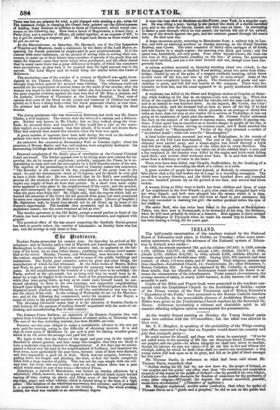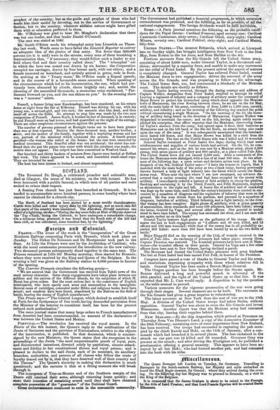IRELAND.
The half-yearly examination of the teachers trained by the National Board of Education took place, in Dublin, on Tuesday; when some inter- esting statements, showing the advance of the National system of Educa- tion in Ireland, were made— In 1833, the schools numbered 789, and the children 107,042; in 1836, school's 1,181, children 153,707; in 1839, schools 1,581, children 192,971; in 1842, schools 2,721, children 319,792; in 1845, schools 3,426, children 432,844: an increase nearly equal to fivefold since 1833. Daring 1845, 260 teachers had been- trained; of whom 173 were males, and 87 females. Their religious opinions are thus classified—Established Church, 14; Presbyterians, 33; other Dissenters, 7; Roman Catholics, 206. A hope was expressed by Mr. Corballis, in submitting these details, that the liberality of Government would enable the Board to in- crease the remuneration of the schoolmasters. Under present circumstances, the- average amount of salary, to nearly 4,000 teachers, is only between 121. and 181. annually to each. Copies of the Bible and Prayer-book were presented to the teachers con-- fleeted with the Established Church by the Archbishop of Dublin; copies of the Donay version of the New Testament, and of Bishop Bolissuet's " Exposition of the Faith," were presented to the Roman Catholics teachers- by Mr. Corballis, in the unavoidable absence of Archbishop Murray; and Bibles were given to the Presbyterian Church teachers by the Reverend Dr. Henry. Addresses inculcating a tolerant and charitable spirit in all matters affecting religious opinion accompanied the presentations.
At the weekly Repeal meeting on Monday, the Young Ireland party came into collision with the O'Connellites; but the affair was allowed to blow over.
Mr. T. F. Meagher, in speaking of the probability of the Whigs coming into office, expressed a hope that no Repealer would desert his country and join that renegade party— He could answer for himself, and those with whom he associated. " If we be not called away in the morning of life like our illustrious friend Thomas Davis, our prophet and our guide—he whose integrity we shall ever strive to emulate, though his labours we may not equal—if it be our fate to live and witness the triumph, toiling for which he died—then shall we receive our recompense: a free young nation will look upon us in its glory, and bid us be glad of heart amongst her free sons." Mr. Thomas Steele, in reference to What had been said about Mr. Thomas Davis, remarked, that " Neither during his life had we, nor now have we, the people of Ireland, as ' our prophet and our guide,' any other man than i the crovrnless and sceptrelesa monarch of the hearts of the people of Ireland'—the lay pontiff of his own religion, Catholicity—the dareful champion for freedom of conscience for the professors of every other religion—O'Connell, the august, the almost sanctified, peaceful, moral-force revolutionist." (Thunders of applause.) Mr. Meagher explained, amidst some confusion, that when he spoke,of Thomas Davis as a "guide and a prophet," he did so not as the guide and
prophet of the country, but as the gaide and prophet of those who had made him their model by devoting, not to the serviee of Goienament or faction, but to the country, whatever abilities nature might have gifted them with or education perfected in them. Mr. O'Mahony was glad to hear Mr. Meagher's declaration that there was but one leader, and that leader Daniel O'Connell.
The rent was stated at 1091.
Mr. Smith O'Brien made his triumphal entry into Limerick on Thurs- day last week. Words seem to have failed the Limerick Reporter to convey an adequate idea of the glories of that entry. Not fewer than 300,000 persons (so it is said) were in the streets; every man of them breathing a determination that, " If necessary, they would follow such a leader to any field where God and their country called them." The " triumphal " car in which the hero was seated was drawn by six horses; the Corporation occupied ten carriages, drawn by-four horses each, with out-riders; and a female mounted on horseback, and entirely attired in green, rode in front. On arriving at the " Treaty. stone," Mr. O'Brien made a Repeal speech; and in the course of it a favourable omen occurred. When speaking of the circumstances which led to his incarceration, the sun, which had pre- viously been obscured by clouds, shone brightly out; and, amidst the cheering of the assembled thousands, a stentorian voice exclaimed, " Par- liament frowned on you, and the sun shines on you." In the evening there was a " monster " soirne.
Fennell, a farmer living near Knocknadoge, has been murdered, on his return home at night from the fair at Kilkenny. Fennell was driving his car, with his young son, a servant-girl, and two men; the assassin shot him dead, and then made off across the fields. No attempt to stop. him was made by the two men companions of Fennell. James Boyle, a brother-in-law of deceased, is in custody; he and Fennell were on bad terms, and had quarrelled on the night of the outrage. There are other suspicious circumstances against the prisoner.
The number of persons poisoned at Kereight turns out to have been greater than was at first reported. Besides the three deceased men, another brother, a sister, and the mother of the family, together with a wayfaring woman and her son; partook of the stirabout which contained the arsenic. A fourth person perished—the woman who called at the house; but the rest were recovered by medical treatment. This dreadful affair was not accidental: the sister has con- fessed that she put the poison into water with which the stirabout was made; the motive does not appear. , The culprit has been committed to Wexford Gaol.
One hundred and thirty baskets of potatoes from Oporto were landed at Belfast last week. The tubers appeared to be sound, and resembled small-sized cups. 'They are intended for seed. The heat has been intense in Ireland, and almost unprecedented.



























 Previous page
Previous page